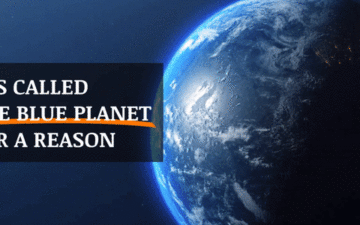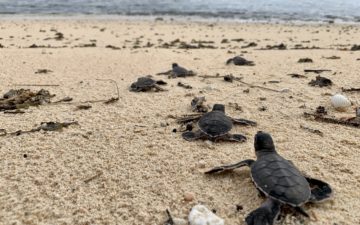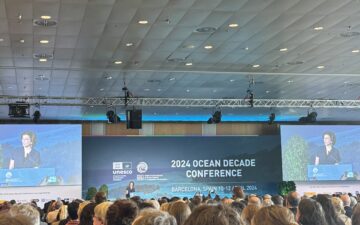Last week, the Collaborative Institute for Oceans, Climate, and Security held its first conference at the University of Massachusetts Boston Campus—appropriately, the campus is surrounded by water. The beautiful views were obscured by wet foggy weather for the first two days, but we got glorious weather on the last day.
Representatives from private foundations, the Navy, the Army Corps of Engineers, the Coast Guard, NOAA and other non-military government agencies, non-profit organizations, and academia gathered to hear speakers on a wide array of issues relating to efforts to improve global security by addressing concerns about climate change and its effect on food security, energy security, economic security, as well as national security. As one opening speaker put it, “True security is freedom from anxiety.”
The conference took place over three days. The panels had two tracks: the policy track and the science track. Ocean Foundation intern, Matthew Cannistraro and I traded concurrent sessions and compared notes during the plenaries. We watched as others were newly introduced to some of the major ocean issues of our time in the security context. Sea level rise, ocean acidification, and storm activity were familiar issues recast in security terms.
Some nations are already struggling to plan for inundation of low-lying communities and even whole countries. Other nations are seeing new economic opportunities. What happens when the short route from Asia to Europe is through the newly cleared summer path across the Arctic when sea ice is no longer present? How do we enforce existing agreements when new issues emerge? Such issues included how to ensure safe operations in new potential oil and gas fields in areas where it is dark six months of the year and fixed structures are ever vulnerable to major icebergs and other harms. Other issues raised included new fisheries access, new competitions for deep-sea mineral resources, shifting fisheries due to water temperature, sea level, and chemical changes, and disappearing islands and coastal infrastructure due to sea level rise.
We also learned a lot. For example, I was aware that the U.S. Department of Defense was a big consumer of fossil fuels, but I didn’t know it was the single biggest individual consumer of fossil fuels in the world. Any reduction in fossil fuel use represents a significant effect on greenhouse gas emissions. I was aware that fuel convoys were particularly vulnerable to attack by hostile forces, but I was saddened to learn that half of the Marines killed in Afghanistan and Iraq were supporting fuel convoys. Any reduction in dependence on fuel clearly saves lives of our young men and women in the field—and we heard about some amazing innovations that are increasing self-reliance of forward units and thus decreasing risk.
Meteorolgist Jeff Masters, the former hurricane hunter and founder of Wunderground, gave an entertaining if sobering look at the possibilities for the “Top 12 Potential $100-Billion Weather-Related Disasters” that could happen before 2030. Most of the possibilities seem to be in the United States. Although I expected him to cite potential hurricanes and cyclones hitting in particularly vulnerable areas, I was surprised by how big a role drought has played in economic costs and the loss of human life—even in the United States—and how more of a role it may play going forward in affecting food and economic security.
We had the pleasure of watching, and listening, as Governor Patrick Deval presented a leadership award to U.S Secretary of the Navy Ray Mabus, whose efforts to steer our Navy and Marine Corps towards energy security are reflective of the Navy’s commitment as a whole to a more sustainable, self-reliant and independent fleet. Secretary Mabus reminded us that his core commitment was to the best, most effective Navy he could promote—and that the Green Fleet, and other initiatives—represented the most strategic way forward to global security. It is too bad that the relevant congressional committees are trying to block this sensible path to improved U.S. self-reliance.
We also had the opportunity to hear from an expert panel on oceans outreach and communication, on the importance of engaging the public in supporting efforts to make our relationship with the oceans and energy part of our overall economic, social, and environmental security. One panelist was The Ocean Project’s Wei Ying Wong, who gave a spirited presentation on the gaps that remain in ocean literacy and the need to capitalize on how much we all care about the ocean.
As a member of the final panel, my role was to work with my fellow panel members to look at the recommendations of our fellow attendees for next steps and to synthesize the material that had been presented at the conference.
It’s always interesting to engage in new conversations about the many ways in which we rely on the oceans for our global well-being. The concept of security—at every level—was, and is, a particularly interesting frame for ocean conservation.







